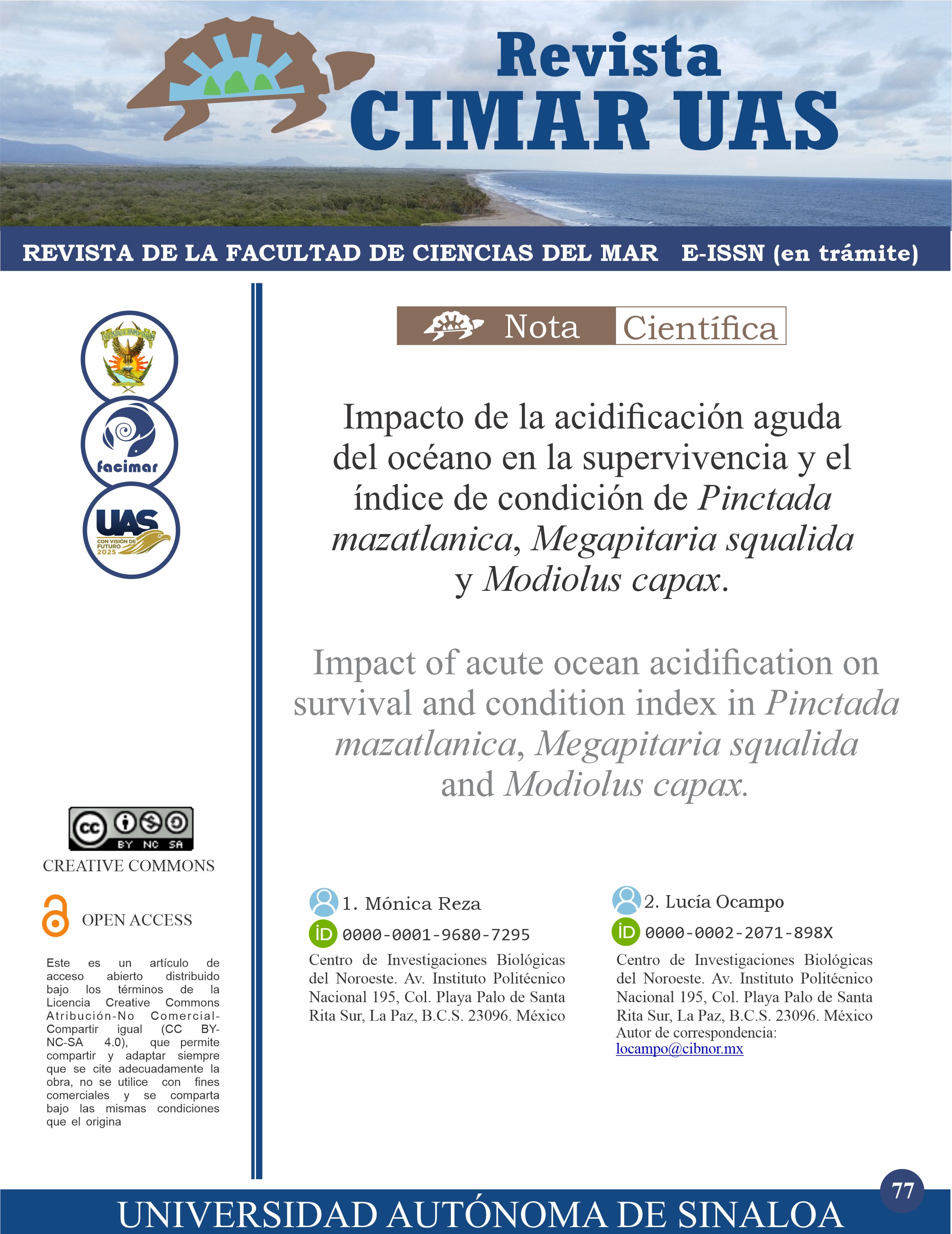Impacto de la acidificación aguda del océano en la supervivencia y el índice de condición de Pinctada mazatlanica, Megapitaria squalida y Modiolus capax.
Palabras clave:
Acidificación del mar, bivalvos, supervivencia, índice de condición, LC50Resumen
El cambio climático y la acidificación del mar son temas de preocupación mundial, señalando a los moluscos como especies altamente susceptibles a estos fenómenos. El método inicial para evaluar las respuestas de los animales al estrés agudo implica evaluar su supervivencia y su índice de condición (IC). En este estudio, evaluamos estas respuestas en tres especies de moluscos con importancia económica - madre perla Pinctada mazatlanica (Pteriidae), almeja chocolata Megapitaria squalida (Veneridae), y mejillón Modiolus capax (Mytilidae) – sometidos a tres distintos pH (8.1, 7.5 y 6.9). La supervivencia en madre perla no se vio afectada por la acidificación del agua, en almeja chocolata disminuyó al 91.7% y en mejillón hasta 75%, en el pH más bajo. Se encontraron diferencias significativas en el IC entre especies, sin embargo, no las hubo entre tratamientos de pH. Lo que sugiere que estos bivalvos son capaces de tolerar la acidificación del mar, al menos en corto tiempo.
Descargas
Referencias
Bamber, R.N. (1987). The effects of acidic sea water on young carpet-shell clams Venerupis decussata (L.) (Mollusca: Veneracea). Journal of Experimental Marine Biology and Ecology. 108(3), 241-260. doi: 10.1016/0022-0981(87)90088-8
Bamber, R.N. (1990). The effects of acidic seawater on three species of lamellibranch mollusc. Journal of Experimental Marine Biology and Ecology. 143(3), 181-191. doi: 10.1016/0022-0981(90)90069-O
Busch, D.S. and McElhany, P. (2017). Using mineralogy and higher-level taxonomy as indicators of species sensitivity to pH: a case-study of Puget Sound. Elementa. 5, 53. doi: 10.1525/elementa.245
Cooley, S.R., Rheuban, J.E., Hart, D.R., Luu, V., Glover, D.M., Hare, J.A. and Doney, S.C. (2015). An integrated assessment model for helping the United States sea scallop (Placopecten magellanicus) fishery plan ahead for ocean acidification and warming. PLOS ONE. 10(5), e0124145. doi:10.1371/journal.pone.0124145
Doney, S.C., Fabry, V.J., Feely, R.A. and Kleypas, J.A. (2009). Ocean acidification: The other CO2 problem. The Annual Review of Marine Science. 1, 169-192. doi: 10.1146/annurev.marine.010908.163834
Doney, S.C., Busch, D.S., Cooley, S.R. and Kroeker, K.J. (2020). The impacts of ocean acidification on marine ecosystems and reliant human communities. Annual Review of Environment and Resources. 45, 83–112. doi: 10.1146/annurev-environ-012320-083019
Duquesne, S., Liess, M. and Bird, D.J. (2004). Sub-lethal effects of metal exposure: physiological and behavioural responses of the estuarine bivalve Macoma balthica. Marine Environmental Research. 58, 245–250. doi:10.1016/j.marenvres.2004.03.066
Gosling, E. (2004). Bivalve Molluscs. Biology, Ecology and Culture. Bodmin, Cornwall, England: MPG Books Ltd. doi:10.1002/9780470995532
Gray, A.P., Lucas, I.A.N., Seed, R. and Richardson, C.A. (1999). Mytilus edulis chilensis infested with Coccomyxa parasitica (Chlorococcales, Coccomyxacea). Journal of Molluscan Studies. 65(3), 289–294. doi: 10.1093/mollus/65.3.289
IPCC. (2013). Summary for Policymakers. In T.F. Stocker, D. Qin , G.-K. Plattner, M. Tignor, S.K. Allen, J. Boschung, A. Nauels, Y. Xia, V. Bex & P.M. Midgley (Eds.), Climate Change 2013: The Physical Science Basis. Contribution of Working Group I to the Fifth Assessment Report of the Intergovernmental Panel on Climate Change. United Kingdom and New York, NY, USA: Cambridge University Press, Cambridge.
Jahnsen-Guzmán, N., Lagos, N.A., Quijón, P.A., Manríquez, P.H., Lardies, M.A., Fernández, C., Reyes, M., Zapata, J., García-Huidobro, M.R., Labra, F.A. and
Duarte, C. (2022). Ocean acidification alters anti-predator responses in a competitive dominant intertidal mussel. Chemosphere. 288, 132410. doi: 10.1016/j.chemosphere.2021.132410
Kroeker, K.J., Kordas, R.L., Crim, R., Hendriks, I.E., Ramajo, L., Singh, G.S., Duarte, C.M. and Gattuso, J.P. (2013). Impacts of ocean acidification on marine organisms: quantifying sensitivities and interaction with warming. Global Change Biology. 19, 1884–1896. doi: 10.1111/gcb.12179
López-Carvallo, J.A., Saucedo, P.E., Rodríguez-Jaramillo, C., Campa-Córdova, A.I., García-Corona, J.L. and Mazón-Suástegui, J.M. (2017). Carbohydrate-Rich diets meet energy demands of gametogenesis in hatchery conditioned mussels (Modiolus capax) at increasing temperatures. Journal of Shellfish Research. 36(3), 649-657. doi: 10.2983/035.036.0314
López-Rocha, J.A., Ceballos-Vázquez, B.P., García-Domínguez, F.A., Arellano-Martínez, M., Villalejo-Fuerte, M. and Romo-Piñera, A.K. (2010). The Squalid Callista Megapitaria squalida (Bivalvia:Veneridae) fishery in Baja California Sur, Mexico. Hidrobiológica. 20(3), 230-237.
Melzner, F., Stange, P., Trübenbach, K., Thomsen, J., Casties, I., Panknin, U., Gorb, S.N. and Gutowska, M.A. (2011). Food Supply and Seawater pCO2 Impact Calcification and Internal Shell Dissolution in the Blue Mussel Mytilus edulis. PLOS ONE. 6(9), e24223. doi: 10.1371/journal.pone.0024223

Descargas
Publicado
Declaración de disponibilidad de datos
Al día 26 de junio las referencias y enlaces del artículo se encontraban disponibles para su verificación.

 Cada manuscrito está bajo la licencia Atribución-NoComercial-SinDerivadas 4.0 Internacional (CC BY-NC-ND 4.0). Puedes consultar los términos de la licencia en el siguiente enlace:
Cada manuscrito está bajo la licencia Atribución-NoComercial-SinDerivadas 4.0 Internacional (CC BY-NC-ND 4.0). Puedes consultar los términos de la licencia en el siguiente enlace: 